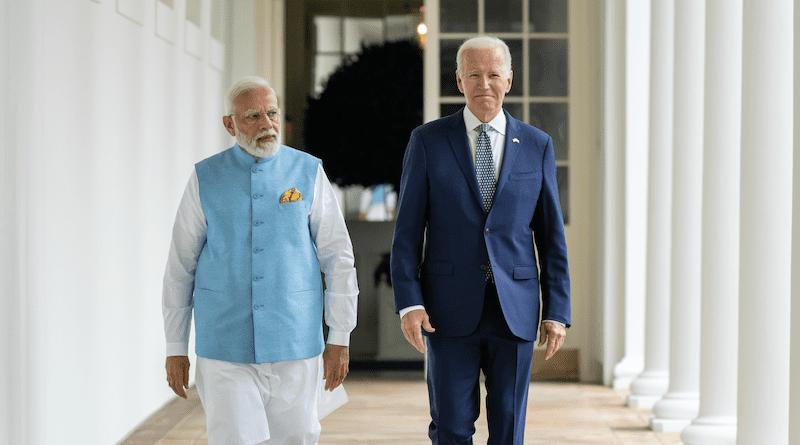Modi’s US Visit And Democratic Backsliding In India – OpEd
By Shaimin Raja
The state dinner organized by the Biden administration in honor of Indian Prime Minister Narendra Modi has generated controversy, as critics argue that the United States is disregarding human rights violations under Modi’s right-wing government in India. Despite concerns surrounding India’s human rights record and the Modi government’s espousal of Hindutva, a far-right Hindu nationalist ideology, the White House spokesperson’s comments during a press conference largely sidestepped these issues. Instead, the spokesperson emphasized the deepening partnership between the two countries and the strategic importance of India as a critical ally in the Indo-Pacific region.
However, the absence of significant mention of human rights concerns in the spokesperson’s remarks has drawn the attention of certain Democratic lawmakers. Over 70 members of the US Senate and House of Representatives signed a letter urging the Biden administration to address human rights issues during talks with Prime Minister Modi. These concerns are centered on reports indicating a shrinking political space, rising religious intolerance, targeting of civil society organizations and journalists, and increased restrictions on press freedoms and internet access in India. The letter reflects the apprehension among lawmakers about the deteriorating state of religious freedom and civil liberties in the country.
The controversy surrounding Modi’s visit also extends to the decision to invite him to address Congress, with some politicians from both major US parties supporting enhanced cooperation with India. However, for certain Democratic lawmakers, Modi’s track record on human rights abuses, anti-democratic actions, discrimination against Muslims and religious minorities, and censorship of journalists renders his presence at the nation’s capital unacceptable. Representative Rashida Tlaib even declared her intention to boycott Modi’s address, expressing her disapproval of his history of human rights violations. When pressed about these concerns, the White House spokesperson affirmed that the Biden administration frequently raises disagreements on human rights issues in discussions with foreign leaders, asserting that human rights are a fundamental aspect of the administration’s foreign policy. Nevertheless, US-based organizations accuse Washington of disregarding systematic rights violations to foster greater cooperation with India, particularly in areas such as arms sales.
Critics argue that the Biden administration’s approach reflects a perceived whitewashing of the human rights situation in India, especially given the significant sanctions placed on Modi in the past. These sanctions were imposed in response to his failure to prevent anti-Muslim violence in Gujarat in 2002 when he served as the state’s leader. Although the sanctions were lifted when Modi became prime minister in 2014, concerns about escalating threats to religious freedoms in India persist, including targeted attacks on minorities and calls for genocide against Muslims made by officials within Modi’s Bharatiya Janata Party (BJP).
Analysts argue that the Biden administration, in its pursuit of allies to counter China’s rise, has largely overlooked these concerns to strengthen ties with India. India, presenting itself as a democracy, has faced less consistent scrutiny compared to countries like Russia and China, despite its drift towards becoming a one-party state under Modi’s leadership. The decision to revoke the semi-autonomous status of Indian-administered Kashmir in 2019, which aligned with the goals of Hindu nationalists, is cited as another example of India’s rightward turn under Modi. Critics assert that the US has remained largely silent on these developments, allowing the Indian government to undermine the rights and freedoms of the Kashmiri people while imprisoning journalists and imposing restrictions on social media platforms without due process.
Despite the relative silence from the US, there are signs of a shift in approach. The letter signed by dozens of legislators expressing concerns about India’s human rights record is seen as a positive development by advocacy groups like the Indian American Muslim Council (IAMC). However, these groups and their supporters stress the need for concrete actions rather than symbolic gestures, and they await tangible policy measures that address the pressing human rights issues in India. The response of US lawmakers to these concerns will serve as a significant test of their commitment to standing up for human rights in the face of strategic alliances and global power dynamics.

